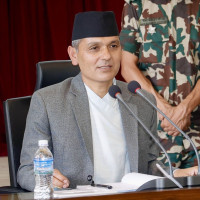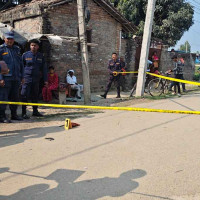- Friday, 20 February 2026
Elderly Citizens Deserve Care And Dignity
Nepal’s Senior Citizens Act 2006 defines senior citizens as those aged 60 and above. It has made provisions about their protection and social security, and the need to cultivate trust, respect, and good faith in them. It equally speaks of utilising their knowledge, skills, ability, and experience for nation-building. True wisdom springs from the old people. It is unveiled by a folk Nepali aphorism Aago tapnu mudako, kura sunnu budako (get warm from a log fire, give ear to the wisdom of the elderly). Creating their space in tune with the UN Decade of Healthy Ageing Agenda can overcome their aging problems. The WHO demands careful support from civil society, government and civic organisations.
In a positive milieu, old people can be energetic in public life and contribute to social progress. Nepal’s ancient scriptures speak of the necessity of inter-generational accountability, valuing parents and teachers on a par with the deity. In Nepal, elderly people are the source of socialisation for children to build good character. They engage in sport with their grandchildren for mutual fitness. Their storytelling and experience sharing can bring them together, infusing thrilling feelings and deep bonds.
They often assemble in public spaces, talk among themselves and with neighbours, which makes them cheerful. They treasure distilled life experience, such as gardening, doing exercise, meditation, cooking or engaging with pets, caring for the homeless, and visiting religious places. They are involved in compassion-generating works. Intergenerational transmission of knowledge, skills, and experience improves the creative pursuits of lives, building an understanding and trust that cannot be learned at formal educational institutions.
Contribution
Many educated families of Nepal have left their parents to care homes, religious sites and even in the streets, forgetting their contribution to raising them. Victims of this culture nurse grievances while others keep silent for fear of losing face in public. Still others engage in legal cases so that part of the property can be retained to sustain their livelihood. Generous people, NGOs and communities are created in Nepal to serve old people and rediscover the loss of path of cultural reciprocity. Cut off from the active life of society due to a lack of physical mobility can easily lead to inferiority complexes.
In Nepal, older people are detached from the younger generations because of modernity, migration and the choice of the nuclear family. They think their parents and grandparents are a social burden to be dispensed with. This hinders the worthy responsibility of the family to seniors and turns them frail despite many lofty provisions of the Nepali Constitution. The United Nations General Assembly has set October 1st as the International Day of Older Persons, ensuring the protection of their human rights.
The elderly face newer challenges they did not experience in earlier times. The state and philanthropic persons had created edifices to support the widows, old age, sick persons and orphans and donated part of their wealth to temples, monasteries and care houses. Its spiritual and moral culture of giving exhibited its civilized character. The decay of spiritual roots has negative effects. Espousing a healthy lifestyle in eating and thinking requires regular consultation with doctors and deterring isolation from the dearest ones. It also necessitates regular physical exercise, eating healthy food, avoiding alcoholic drinks and smoking, and emotionally balanced ties with the family.
Diseases of old age, like hazy eyes, knee, back, and neck pain, worsen their lifestyle and block physical mobility. Diabetes, dementia, hearing loss, chronic obstructive pulmonary etc., increase their dependence. Arthritis, refractive errors, sadness, etc., easily cut their social and mental well-being. The Nepali joint family system has so far provided grandparents and parents with authority in decision-making. The social system was tied by the bond of love, affection, affinity and respect. It has strengthened each other’s meaningful role and collective happiness.
Emotional closeness with each other harnessed comfort. The erosion of old family values has eased social mobility, migration, the breakdown of family, and the atomization of life. Young couples leave their parents in the villages and migrate to urban areas for jobs, education for their children, health access, and to relish the amenities of modern life. This has stifled the joyful life of old people and their longing to live with their children, draining their psychic energy. Many old people have to live only on their state-granted social security.
Migration
Huge migration of Nepali youths has left their dependent parents either in old houses, care shelters, or streets, detaching them from the affinity of the family, causing untimely death. Their siblings fight for ancestral property and abuse torments them. Deterioration of native ethics of caring elderly rolls the pangs of injustice. For older people from poor families, the social safety net alone cannot ensure their survival needs. Only the holders of government services are entitled to pension coverage and enjoy a decent life. The legacy of respecting elderly people is vital to their dignity. Youth need to develop the capacity to assume their responsibility.
The rise in life expectancy in Nepal has increased the number of older people. Many complain that they are unable to regulate their daily tasks like eating, bathing, getting dressed, walking and going to the toilet at their will. Their unhealthy state has weakened them, resorting to abnormal conduct like not dining together with family, staying silent, abstaining from joint activities, making harsh noise and amnesia. At times, their grumbling goes beyond the family walls. In this case, the family should help them without scolding. In case of pain, one should consult a doctor and provide medications. Therapists can detect mood swings or behavioural changes. Many who live alone are vulnerable to such situations. In this sense, state subsidies, societal support, and community security can release them from such a dejected state and enable them to lead happy and dignified lives.
(Dahal holds an MA in Peace and Conflict from Otto-Von Guericke University, Germany)














